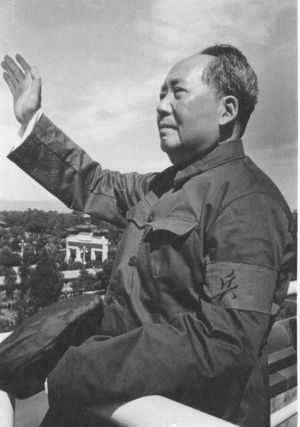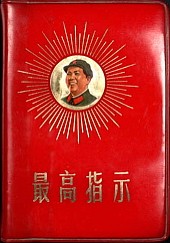Difference between revisions of "Mao Zedong"
Conservative (Talk | contribs) |
|||
| Line 4: | Line 4: | ||
Mao was the author of ''[[Quotations from Chairman Mao]],'' published in 1966, informally known as "the little red book." During his lifetime, almost everyone in the People's Republic of China was expected to have a copy. | Mao was the author of ''[[Quotations from Chairman Mao]],'' published in 1966, informally known as "the little red book." During his lifetime, almost everyone in the People's Republic of China was expected to have a copy. | ||
| + | [[Image:Little red book.jpg|left|200px|thumb|''Quotations from Chairman Mao Zedong'' or popularly known as "the little red book" is a required reading for every Chinese citizen to own, read, and carry it at all times under the latter half of Mao's rule.]] | ||
With the aid of [[Comintern]] operatives in the US Government subverting [[President Roosevelt]]'s vision of a post-War [[United Nations]] enforcing peace by "the four policemen". <ref>Townsend Hooper and Douglas Brinkley, [http://www.ninehundred.net/~jveon/fdrbook.html ''FDR and the Creation of the U.N.''] (New Haven, 2000).</ref><ref>[http://www.state.gov/r/pa/ho/time/wwii/17604.htm U.S. State Department], Office of the Historian, Timeline of U.S. Diplomatic History 1937-1945, United Nations.</ref> Mao defeated Chiang Kai-shek's Nationalists, taking control of the Chinese mainland and establishing the People's Republic of China. As the leader of China, Mao initiated the [[Great Leap Forward]], an economic plan intended to rapidly industrialize China's then largely rural economy. In the end it proved a failure, preventing the peasants from producing needed food and causing massive famines; over 20 million people starved to death. Later, Mao instigated the [[Cultural Revolution]], in which those disloyal to the party were killed or humiliated in order to solidify Mao's control. [[Richard Nixon]] was the first United States president to meet with Mao, and thus the first to acknowlege the existence of the People's Republic of China, as opposed to Taiwan's Republic of China. | With the aid of [[Comintern]] operatives in the US Government subverting [[President Roosevelt]]'s vision of a post-War [[United Nations]] enforcing peace by "the four policemen". <ref>Townsend Hooper and Douglas Brinkley, [http://www.ninehundred.net/~jveon/fdrbook.html ''FDR and the Creation of the U.N.''] (New Haven, 2000).</ref><ref>[http://www.state.gov/r/pa/ho/time/wwii/17604.htm U.S. State Department], Office of the Historian, Timeline of U.S. Diplomatic History 1937-1945, United Nations.</ref> Mao defeated Chiang Kai-shek's Nationalists, taking control of the Chinese mainland and establishing the People's Republic of China. As the leader of China, Mao initiated the [[Great Leap Forward]], an economic plan intended to rapidly industrialize China's then largely rural economy. In the end it proved a failure, preventing the peasants from producing needed food and causing massive famines; over 20 million people starved to death. Later, Mao instigated the [[Cultural Revolution]], in which those disloyal to the party were killed or humiliated in order to solidify Mao's control. [[Richard Nixon]] was the first United States president to meet with Mao, and thus the first to acknowlege the existence of the People's Republic of China, as opposed to Taiwan's Republic of China. | ||
| − | |||
==References== | ==References== | ||
Revision as of 02:08, May 24, 2007
Mao Zedong (an alternative transliteration (using the Wade-Giles system is "Mao Tse-tung", although most Sinologists use the pinyin transliteration system, giving: "Mao Zedong") lived from December 26, 1893 to Semptember 9, 1976. He was a Marxist and an early memmber of the Chinese Communist Party in 1921.
Mao was the author of Quotations from Chairman Mao, published in 1966, informally known as "the little red book." During his lifetime, almost everyone in the People's Republic of China was expected to have a copy.
With the aid of Comintern operatives in the US Government subverting President Roosevelt's vision of a post-War United Nations enforcing peace by "the four policemen". [1][2] Mao defeated Chiang Kai-shek's Nationalists, taking control of the Chinese mainland and establishing the People's Republic of China. As the leader of China, Mao initiated the Great Leap Forward, an economic plan intended to rapidly industrialize China's then largely rural economy. In the end it proved a failure, preventing the peasants from producing needed food and causing massive famines; over 20 million people starved to death. Later, Mao instigated the Cultural Revolution, in which those disloyal to the party were killed or humiliated in order to solidify Mao's control. Richard Nixon was the first United States president to meet with Mao, and thus the first to acknowlege the existence of the People's Republic of China, as opposed to Taiwan's Republic of China.
References
- ↑ Townsend Hooper and Douglas Brinkley, FDR and the Creation of the U.N. (New Haven, 2000).
- ↑ U.S. State Department, Office of the Historian, Timeline of U.S. Diplomatic History 1937-1945, United Nations.

